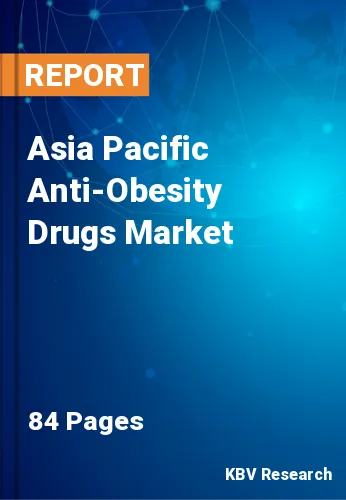The Asia Pacific Anti-Obesity Drugs Market would witness market growth of 11.6% CAGR during the forecast period (2023-2029).
In recent clinical trials, the latest generation of anti-obesity medications has shown better weight loss outcomes and a safer side effect profile, making them more appealing than older drugs. These therapies replicate the hormones naturally produced by the intestines during the process of eating. Hormones trigger the pancreas to secrete insulin. GLP-1 enhances satiety. Increases gastric retention time. Lowers blood glucose levels. GLP-1 drugs have proven to be beneficial for treating obesity, in addition to their effectiveness in managing diabetes.
Recent research conducted on adolescents with obesity revealed that the medication was equally effective for them. In addition to the reduction of body weight, there are other advantages to consider: Reduced waist size. Reduced inflammation. Reduced hypertension. Lowered levels of cholesterol and triglycerides for improved health, which is expected to increase their adoption among general audience and thereby surge the market growth.
According to the latest national statistics for New Zealand, 10% of the male and 13% of the female population were classified as obese. In comparison, 55% of males and 38% of females were categorized as overweight. Based on international and regional studies, the prevalence of obesity is on the rise. The objectives of Agencies for Nutrition Action include raising awareness about the health consequences of obesity and expanding programs that prioritize obesity prevention. The government's measures to decrease the cases of obesity due to the high rate of illnesses and the utilization and development of various anti-obesity drugs are expected to increase, propelling the market growth in APAC.
The China market dominated the Asia Pacific Anti-Obesity Drugs Market by Country in 2022, and would continue to be a dominant market till 2029; thereby, achieving a market value of $257.2 million by 2029. The Japan market is estimated to grow a CAGR of 10.9% during (2023 - 2029). Additionally, The India market would experience a CAGR of 12.3% during (2023 - 2029).
Based on Drug Type, the market is segmented into Prescription Drugs and Over The Counter Drugs. Based on Mechanism of Action, the market is segmented into Centrally Acting and Peripherally Acting. Based on Route Of Administration, the market is segmented into Oral Route and Subcutaneous Route. Based on Distribution Channel, the market is segmented into Hospital Pharmacies, Retail Pharmacies, and Online Pharmacies. Based on countries, the market is segmented into China, Japan, India, South Korea, Singapore, Malaysia, and Rest of Asia Pacific.
Free Valuable Insights: The Worldwide Anti-Obesity Drugs Market is Projected to reach USD 3.1 Billion by 2029, at a CAGR of 10.6%
The market research report covers the analysis of key stake holders of the market. Key companies profiled in the report include Pfizer, Inc., Boehringer Ingelheim International GmbH, GlaxoSmithKline PLC, Novo Nordisk A/S, Rhythm Pharmaceuticals, Inc., Gelesis Holdings Inc. (PureTech Health), Currax Pharmaceuticals LLC (Currax Holdings USA LLC), Vivus LLC, CHEPLAPHARM Arzneimittel GmbH (Braun Beteiligungs GmbH) and KVK Tech, Inc.
By Drug Type
By Mechanism of Action
By Route Of Administration
By Distribution Channel
By Country
Our team of dedicated experts can provide you with attractive expansion opportunities for your business.

